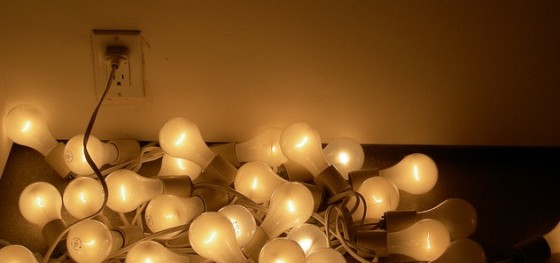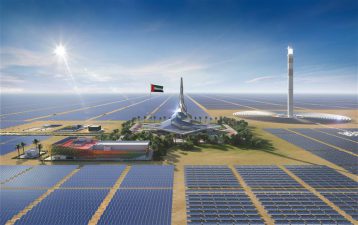Lewis Strauss, Chairman of the US Atomic Energy Commission said this to a group of science writers in 1954: “Our children will enjoy in their homes electrical energy too cheap to meter…” While this comment is often given as an example of overly-optimistic technological predictions, electricity is incredibly inexpensive. Just look at how much is wasted illuminating the night sky.
Would Strauss have ever imagined that people would be able to afford the energy required to make it snow in Dubai? Or that the hundreds of megawatt-hours used to remove salt from seawater would cost less than fresh water?
Sony intends to solve this “too cheap to meter” problem by lowering the cost of metering small amounts of electricity and by making it possible to measure electricity usage for individuals and their devices with smart sockets.
The back story on smart sockets
The Mideast uses forty-five billion kilowatt-hours to produce three million tons of aluminum each year. Only about half of this aluminum is recycled which means we’re throwing away over 20 billion kilowatt-hours of electricity every year. The energy required to replace a single discarded aluminum can would power a 15 Watt compact fluorescent bulb for 24 hours.
Some corporations pay a flat electric rate based on their estimated maximum usage averaged over several years. Airports, universities, cafes, hotels and some rental accommodations don’t charge customers for plugging in devices. So for some classes of consumers, electricity really is ‘too cheap to meter.’
The problem with “free” is that it isn’t really free.
But as with any “free” resource is that there is absolutely no incentive to conserve. In 1997 the Republic of Ireland abolished urban domestic water charges. Only a few years passed before people began to experience water shortages even here where it rains nearly every day and where annual rainfall ranges from 1000mm-2800mm.
I spent the last week of 2010 collecting snowmelt from the roof in order to flush our toilets because too many people left their taps running and drained the local reservoir. Pipes are so leaky that only 50% of municipal water ever reaches residential taps. Now Ireland is bringing back water charges, out of necessity.
When there is no method for accurately measuring and charging for the consumption of a limited resource, there is no financial incentive to conserve. There is a mismatch between the economic model and ecological reality so those who act responsibly end up subsidizing those who don’t. Economist Milton Friedman put it this way, “If you put the government in charge of the Sahara desert, in five years there would be a shortage of sand.”
What are smart sockets?
Ordinary outlets have no idea whether you’ve plugged in a TV, toaster or a pair of chopsticks. If you happen to plug a device designed for the 127 Volt 60Hz AC Saudi Arabian standard into an outlet in Jordan, Israel or U.A.E. where the standard is 220V 50Hz AC, a puff of foul-smelling smoke may be your first indications that you shouldn’t have done that.
One of my first experiences with ‘dumb’ sockets was when I noticed that the metal parts of a television would give me a shock if I happened to plug it in backwards. North American plugs were eventually designed with one prong slightly larger in order to prevent this ‘hot chassis.’ Several years later I stepped into a friend’s home just in time to see her toddler pushing a plug into an outlet, her drool-soaked fingers touching both prongs of a plug. The child would have been shocked if the plug hadn’t been the wrong way around. Power outlets with a 50/50 chance of disaster are not very smart.
Smart outlets will be more like the USB ports on a personal computer. When you plug in a USB device, there is a conversation between the device and the computer. It goes something like this:
Computer: Who goes there? Device: Hi, I'm a USB hard drive. Computer: What do you want? Device: How about 5 volts at 300 milliamps? Computer: That's too much! I already have an iPhone sucking 250ma Device: How about 200 milliamps? Computer: Hmm, 5V * 200ma = 1000 milliwatts. OK, don't hurt yourself.
This seems much more sensible than the system where power sockets always provide a dangerous fixed voltage which each device must convert to meet its own requirements with those ugly “wall wart” adapters.
President Bush called these adapters “energy vampires” because some waste more than half of the electricity that goes through them. They also consume energy even when the connected device is turned off. A 2002 report estimated that 1% of the U.S. electrical consumption, amounting to 32 billion kilowatt-hours, is wasted by power adapters.
Possibilities with smart sockets
Once power outlets can communicate with devices, some interesting possibilities emerge. For instance, utilities could charge a lower rate for basic necessities such as hospital dialysis machines and a higher rate for the iPhones plugged into the hospital’s lobby. Being able to track and bill individual users would encourage businesses to install charging stations for devices and electric vehicles. It would also allow for pricing models which reward people for conserving electricity.
A German company advertises a device which claims to stop nuclear generated electricity from entering your home by rejecting electrons which come from nuclear power plants. It’s based on bogus science and is about as practical as a mood ring. But with smart outlets it will be possible to design appliances which require particular energy sources.
Plug a solar device into a coal outlet and you might see this message:

Consumers could also configure their outlets to reject inefficient devices in exchange for a lower rate. Since usage follows the user, it would be possible to choose solar energy when away from home. The billing model would be very similar to mobile phone roaming plans. I could even imagine reverse vending machines which would accept aluminum cans for recycling and use the kilowatt savings to top up your personal energy account.
Some might view Sony’s proposal with fear or as an inconvenience for consumers. I see it as empowering for consumers and businesses. Any inconvenience will help shape our behavior to more closely match the reality that we live in a world with finite resources. The sooner we move to an economic system which takes this into account, the better it will be for ourselves and for future generations.





Hello Brian ,first and foremost thanks for the brilliant article. I feel sorry that you had to spend the last days of 2010 with such an Inconvenience . I think people really need to be educated on efficiently using our precious water reserves and electricity.
Thanks again.
Smart Meters – something to be afraid of? http://www.squidoo.com/beware-of-smart-meters